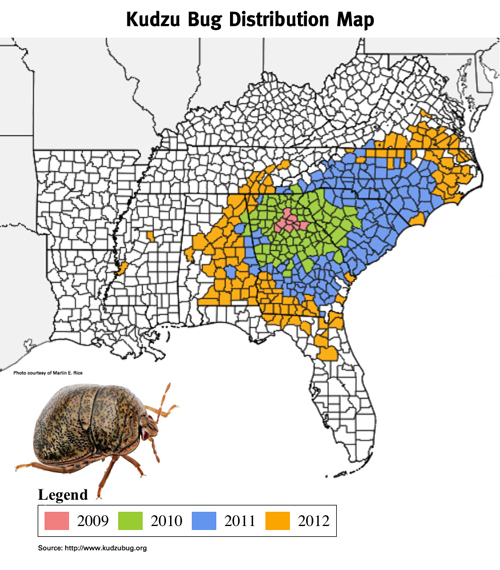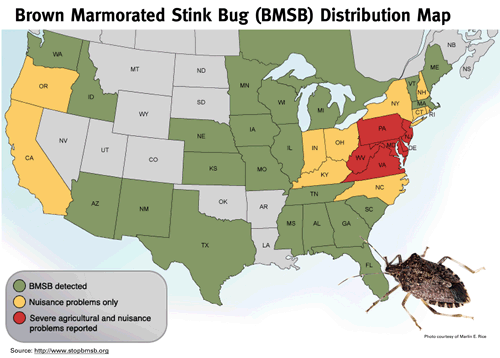Kudzu bugs and brown marmorated stink bugs spread, feasting on soybeans and reducing yields

Kudzu bugs and brown marmorated stink bugs have been rapidly spreading to new geographies. Brown marmorated stink bugs (BMSB) have already been detected in a number of states, up to 38 in total, including every state east of the Mississippi. Kudzu bugs have rapidly spread across eight southeastern states since the first detection three years ago.
Strong fliers with the ability to hitchhike on vehicles and farm equipment, both types of bugs threaten soybean fields. After arriving in a new territory, the bugs have the ability to overwinter and repopulate the following spring.
"The kudzu bug has been spreading the fastest, and it is difficult to predict how far north the kudzu bug will travel," reports Paula Davis, DuPont Pioneer senior manager for insect and disease resistance traits. "As for the brown marmorated stink bug, further expansion into the Midwest is possible, although establishment in a new area generally takes four to six years."
Both bugs cause feeding damage, reducing soybean yields. To reduce risk from future kudzu bug and BMSB infestations, growers must keep tabs on threat levels for the coming season, closely monitor fields and follow insect reports. For pest management, close scouting and insecticides are the best solutions.

Kudzu bugs, also called bean plataspids, are primarily hosted by kudzu and soybean plants. Adult kudzu bugs are known to fly 1 1/2 miles from kudzu, an invasive weed that covers much of the South, to soybean fields. Feeding on soybean stems and leaves, kudzu bugs induce stress on soybeans, reducing pods per plant, seeds per pod and seed size. Bug colonies in soybean fields may also reduce yields and cause harvest problems by delaying soybean maturity and causing green stem syndrome.
The average yield loss due to kudzu bug infestations has been measured at 18 percent in Georgia and South Carolina and may range up to 47 percent. Since the bugs feed on soybean stems, the insecticide treatment must penetrate the canopy to be effective.

Like kudzu bugs, BMSB may induce yield loss and poor seed quality in soybeans. In corn, ear feeding injury may increase potential for ear molds and also negatively impact seed quality.
Unlike kudzu bugs, BMSB are not new pests. These insects have been in the United States for years, and populations have increased during the past couple of summers. Hosts for BMSB include more than 20 tree, shrub and small fruit species and many vegetable and field crops. These insects have the potential to be highly destructive to crops, including sweet corn and soybeans.
"In the spring, the bugs are first attracted to flowering trees to feed and lay eggs. In early summer, they may fly to corn before moving to soybeans during the pod development phase," explains Davis. "The bugs can be difficult to control, because they are strong flyers and can easily move in and out of a field in the same growing season."
Unfortunately, these distasteful bugs have few natural enemies in North America. For management, close scouting is essential, particularly around the field borders where bugs tend to feed. Many insecticides are labeled for stink bug control, although BMSB may be more tolerant of many pesticides than other stinkbugs. Also, due to the pests' high mobility, a second treatment may be necessary.
For more information on pest management options, talk to your local Extension agent or DuPont Pioneer agronomist.
DuPont Pioneer is the world's leading developer and supplier of advanced plant genetics, providing high-quality seeds to farmers in more than 90 countries. Pioneer provides agronomic support and services to help increase farmer productivity and profitability and strives to develop sustainable agricultural systems for people everywhere. Science with Service Delivering Success.
DuPont (NYSE: DD) has been bringing world-class science and engineering to the global marketplace in the form of innovative products, materials, and services since 1802. The company believes that by collaborating with customers, governments, NGOs, and thought leaders, we can help find solutions to such global challenges as providing enough healthy food for people everywhere, decreasing dependence on fossil fuels, and protecting life and the environment. For additional information about DuPont and its commitment to inclusive innovation, please visit www.dupont.com.
10.17.2012